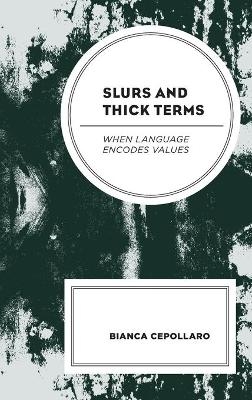
Slurs and Thick Terms
When Language Encodes Values
Seiten
2020
Lexington Books (Verlag)
9781793610522 (ISBN)
Lexington Books (Verlag)
9781793610522 (ISBN)
What is the relation between language, communication, and values? In Slurs and Thick Terms, Bianca Cepollaro explores the ways in which certain pieces of evaluative language, such as slurs and so-called thick terms, not only reflect speakers’ moral perspectives, but also contribute to promote the speaker’s evaluative stance.
What is the relation between language, communication, and values? In Slurs and Thick Terms: When Language Encodes Values, Bianca Cepollaro explores the ways in which certain pieces of evaluative language not only reflect speakers’ moral perspectives, but also contribute to promoting their evaluative stance. She focuses on slurs—the prototypical example of hate speech, including racial and homophobic epithets—and so-called thick terms, that is, those expressions, much discussed in metaethics, that mix description and evaluation such as "lewd," "chaste," "generous," or "selfish." This book argues that in employing such terms, speakers not only say something purely factual about people and things, but also presuppose certain values, as if they were common ground among the conversation participants. Cepollaro illustrates how this linguistic mechanism effectively explains the pervasive social and moral effects of evaluative language. Using a multidisciplinary approach, she tackles issues in philosophy of language, linguistics, ethics, and metaethics. Moreover, the theoretical investigation takes into consideration and discusses empirical data from psychology and experimental philosophy.
What is the relation between language, communication, and values? In Slurs and Thick Terms: When Language Encodes Values, Bianca Cepollaro explores the ways in which certain pieces of evaluative language not only reflect speakers’ moral perspectives, but also contribute to promoting their evaluative stance. She focuses on slurs—the prototypical example of hate speech, including racial and homophobic epithets—and so-called thick terms, that is, those expressions, much discussed in metaethics, that mix description and evaluation such as "lewd," "chaste," "generous," or "selfish." This book argues that in employing such terms, speakers not only say something purely factual about people and things, but also presuppose certain values, as if they were common ground among the conversation participants. Cepollaro illustrates how this linguistic mechanism effectively explains the pervasive social and moral effects of evaluative language. Using a multidisciplinary approach, she tackles issues in philosophy of language, linguistics, ethics, and metaethics. Moreover, the theoretical investigation takes into consideration and discusses empirical data from psychology and experimental philosophy.
Bianca Cepollaro is research fellow of philosophy at the Vita-Salute San Raffaele University (Milan).
Acknowledgements
Introduction
Part I. The Presuppositional Account of Hybrid Evaluatives
Chapter 1. Hybrid Evaluatives: a New Class
Chapter 2. The Semantics of Hybrid Evaluatives
Chapter 3. The Dynamics of Hybrid Evaluatives: Complicity, Propaganda, Rejection, Negotiation
Chapter 4. Defending a Uniform Presuppositional Account of Slurs and Thick Terms
Chapter 5. Non-standard Uses of Hybrid Evaluatives
Part II. Rival Theories
Chapter 6. Truth-conditional Theories: It’s Just a Matter of Semantics
Chapter 7. Deflationary Theories: It’s Just a Matter of Pragmatics
Chapter 8. An alternative Hybrid Theory: Conventional Implicature
Conclusion
| Erscheinungsdatum | 10.05.2021 |
|---|---|
| Reihe/Serie | Philosophy of Language: Connections and Perspectives |
| Sprache | englisch |
| Maße | 163 x 240 mm |
| Gewicht | 458 g |
| Themenwelt | Geisteswissenschaften ► Philosophie ► Sprachphilosophie |
| Geisteswissenschaften ► Sprach- / Literaturwissenschaft ► Sprachwissenschaft | |
| Sozialwissenschaften ► Kommunikation / Medien ► Kommunikationswissenschaft | |
| ISBN-13 | 9781793610522 / 9781793610522 |
| Zustand | Neuware |
| Informationen gemäß Produktsicherheitsverordnung (GPSR) | |
| Haben Sie eine Frage zum Produkt? |
Mehr entdecken
aus dem Bereich
aus dem Bereich
Eine Philosophie der künstlichen Intelligenz
Buch | Softcover (2025)
C.H.Beck (Verlag)
CHF 34,90
Unser schöner neuer Sprachgebrauch
Buch | Hardcover (2025)
zu Klampen Verlag
CHF 27,90


